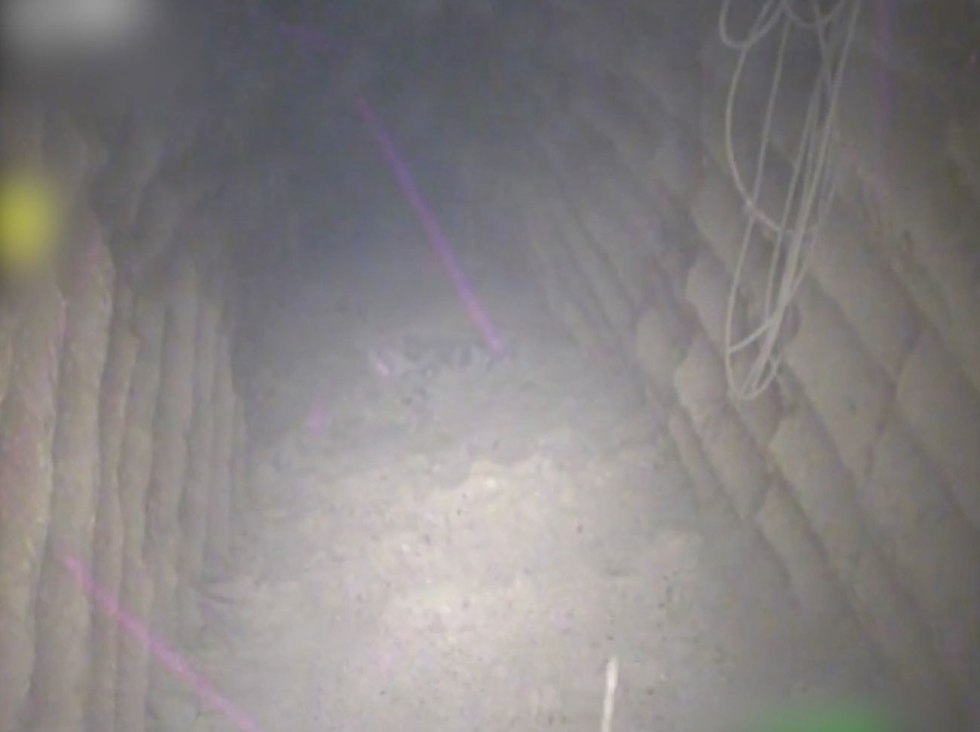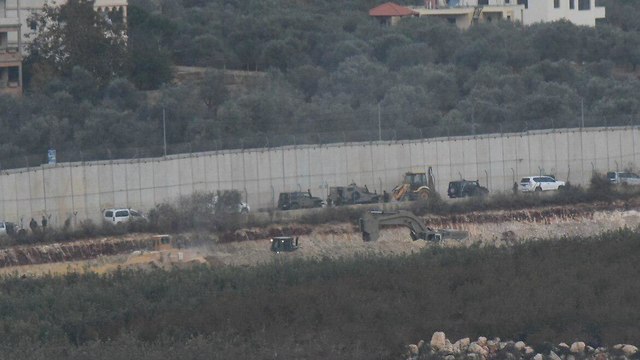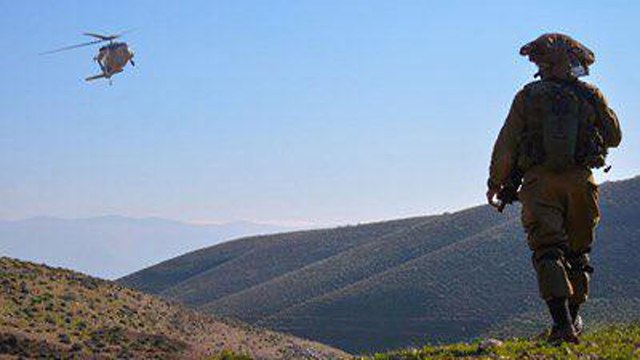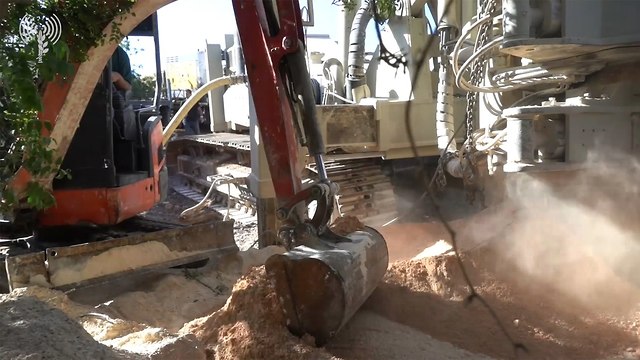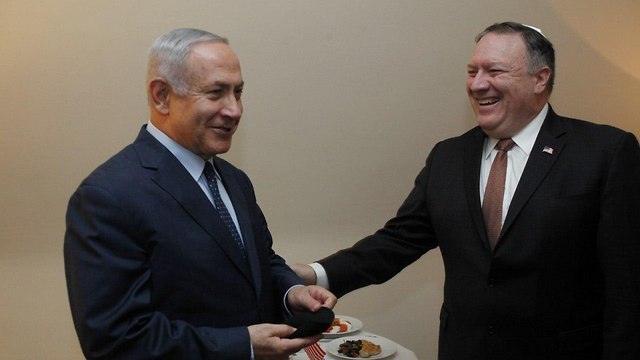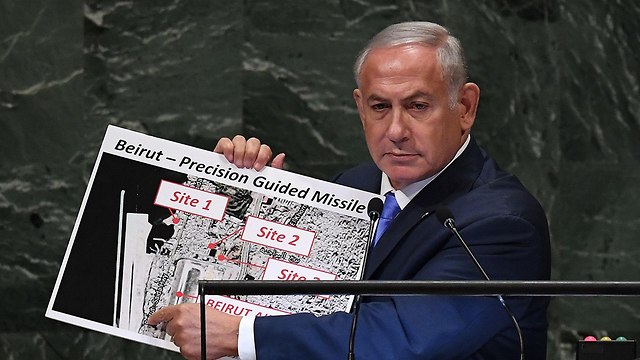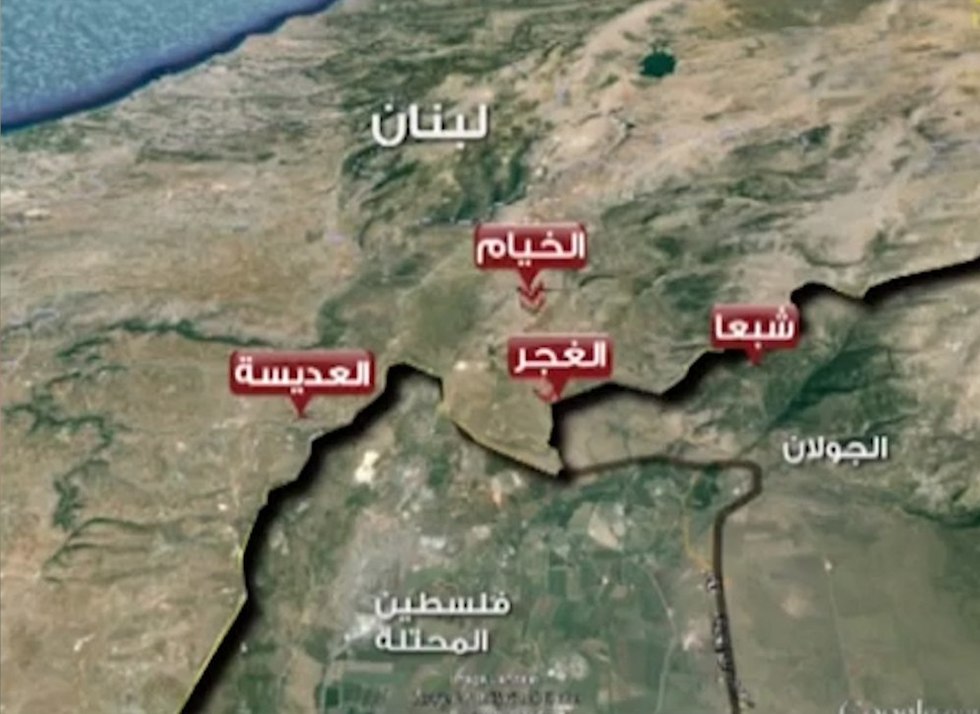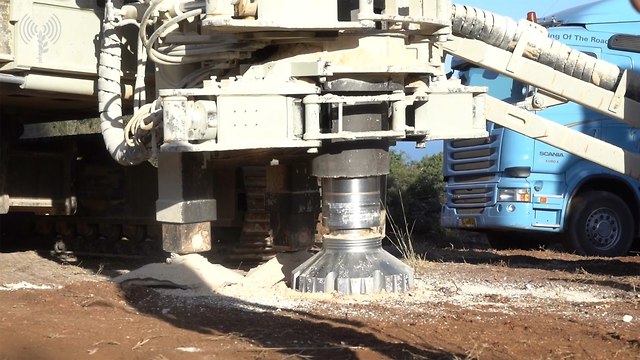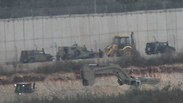
IDF launches operation to neutralize Hezbollah tunnels
Israel announces beginning of Operation Northern Shield after discovering Hezbollah efforts to construct network of offensive tunnels on Lebanon border; 'This is the most blatant proof of the violation of UN Resolution 1701 that ended the Second Lebanon War,' IDF says.
It is unclear how many tunnels snake into Israeli territory from Lebanon, but the IDF stressed they were not operational and do not pose an immediate threat to Israel.
At present, work to expose the tunnels was taking place in Israeli territory, but IDF Spokesman Brig. Gen. Ronen Manelis noted that "Neutralizing the tunnels will not necessarily be done in our territory."
One tunnel has already been found, stretching from a residential structure in the south of Kafr Kela in Lebanon and reaching 40 meters (130 feet) into Israeli territory. The IDF said it took Hezbollah two years to dig the 200-meters-long (656 feet) tunnel in the rocky terrain, adding there are longer tunnels.
The tunnel is about two meters tall and two meters wide (6 feet 7 inches) and includes ventilation systems, electricity and piping. It was dug 25 meters (82 feet) under ground.
Unlike the tunnels Hamas is digging in Gaza, Hezbollah's tunnel does not require concrete walls as it is supported by the rocky terrain it was dug through.
IDF officials estimated the operation would last a few weeks, but noted that it depended on how Hezbollah would choose to respond. Israel will also demand to implement its defensive measures in areas along the border that are under dispute, which could lead to protest from the Lebanese government.
"We've been preparing for this operation for two and a half years, with a standing operating procedure led by the IDF chief personally," the IDF said.
"This is the most blatant proof of the violation of UN Security Council Resolution 1701 that ended the Second Lebanon War," the IDF accused.
"The tunnels pose a risk to the Lebanese residents across the border as well, and we see the Lebanese government as responsible for everything that happens north or the border," the IDF added. "The fact is that the Lebanese army does not control the area and doesn't take responsibility for southern Lebanon, while Hezbollah is the one operating in the area and in the Shiite villages. Behind Hezbollah is Iranian knowledge and money, and we will deal with that in the coming days as well."
The IDF added it had "enhanced its presence and readiness in the Northern Command and is prepared for various scenarios," but noted there were no special instructions for residents of northern Israel.
Some areas near the border fence had been declared a closed military zone, with most of the army's operations taking place near Metula.
"We are in complete control over the operation, which is going according to plan, and we are determined to remove the underground threat to the State of Israel," the army went on to stress.
IDF Chief of Staff Gadi Eisenkot held a situation assessment in the Northern Command on Tuesday, following which he took a tour of the border and met with mayors in the north.
IDF Spokesman Brig. Gen. Ronen Manelis said Operation Northern Shield was so top secret there were General Staff members who did not know about it until Tuesday morning.
Manelis said reinforcements from the Commando Brigade were deployed along the border alongside infantry and Armored Corps. "Reinforcements of IAF aircraft and Navy vessels were also sent to the north... we're preparing for a long operation, therefore we prepared several options," he said.
A Lebanese military official told The Associated Press that Lebanese troops and military intelligence agents, along with UN peacekeepers deployed in southern Lebanon, were observing the border on Tuesday.
An official from the so-called "Axis of Resistance"—a grouping led by Iran and made up of Syrian officials, Iraq Shiite militias, Hezbollah and other groups—said Hezbollah fighters were "on high alert to confront any possible Israeli aggression."
Malene Jensen, spokeswoman for the UN force in Lebanon known as UNIFIL, said the situation in the peacekeepers' "area of operation remains calm" and that they are in touch with all relevant parties to make sure calm and stability is maintained.
"We see Hezbollah's activities as a flagrant and blatant violation of Israeli sovereignty," said Lt. Col Jonathan Conricus, a military spokesman. "This activity is another example of the negative effects of Iranian entrenchment in the region."
Conricus said that Hezbollah has been developing an offensive plan against Israel that would "shift the battleground into Israel." The group would use firepower and ground units and "the surprise component of that plan was supposed to be tunnels that would allow infiltrators into Israel."
Meanwhile, the IDF issued warnings in Arabic to Hezbollah fighters and Lebanese troops not to come near the offensive tunnels Israel was working on neutralizing. "Your life is in danger, beware," Avichay Adraee, the IDF spokesman in Arabic, wrote on Twitter.
Netanyahu to Lebanon: Stop Hezbollah's armament or we'll act
The operation comes hours after Prime Minister Benjamin Netanyahu held a last-minute trip to Brussels to meet US Secretary of State Mike Pompeo, in which the two discussed "ways to halt together Iranian aggression in the region," including in Lebanon.
Netanyahu asked Pompeo to pass on a message to the Lebanese government, telling them that if Beirut doesn't stop Hezbollah's armament efforts, Israel will have to take action. Israel sent a similar message to Lebanon recently through France.
An Israeli government source said the purpose of the meeting was to update Pompeo of the upcoming tunnel operation.
"I want to thank you for everything that you're doing, for your strong statements on the latest violation by Iran on the ballistic missiles," Netanyahu told Pompeo. "I look forward to discussing with you how we can together curb Iran's aggression in the region, in Syria, in Iraq, in Lebanon and elsewhere and to continue our efforts to achieve peace and security for everyone."
During the 3.5-hour-long meeting, Pompeo "emphasized the United States' commitment to Israel's security and absolute right to self-defense and to fighting anti-Israeli bias at the United Nations," a State Department statement said.
"The Secretary reiterated US support for warming ties and increased dialogue between Israel and its neighbors in the Middle East and Africa, including Oman and Chad. Secretary Pompeo noted the strength of the US-Israel alliance and our multifaceted cooperation. He reiterated America’s resolve in confronting the totality of the Iranian regime’s threats through maximum pressure," the State Department added.
Netanyahu was joined in Brussels by Mossad Director Yossi Cohen, National Security Advisor Meir Ben Shabbat and his military secretary. He returned to Israel immediately after the meeting.
During an address to the United Nations in September, Netanyahu identified three locations in Lebanon where, he said, Hezbollah was converting "inaccurate projectiles" into precision-guided missiles. He warned the group that Israel would not let it "get away with it."
A few weeks ago Netanyahu also hinted at an upcoming Israeli offensive during a televised address. He offered no details, but said: "I will not say this evening when we will act and how. I have a clear plan. I know what to do and when to do it. And we will do it."
He said an upcoming security challenge would require Israelis to "endure sacrifice."
Although its attention has been diverted to violent protests along its border with Gaza in recent months, Israel's main security concerns lie to the north, along the border with Lebanon.
Israeli officials have long warned the threat posed by Gaza's Hamas rulers pales in comparison to that of Lebanon's Iran-backed Hezbollah—a heavily-armed mini-army with valuable combat experience and an arsenal of some 150,000 rockets that can reach nearly every part of Israel.
Hezbollah, founded in 1982 by Iran's Revolutionary Guards, has grown stronger since the 2006 Second Lebanon War with Israel, notably through its role in the Syrian war fighting in support of President Bashar Assad. With Syria's civil war winding down, Hezbollah is now free to re-establish itself back home in Lebanon and refocus on Israel.
Over the past decade, Israel and Hezbollah have largely maintained a stand-off—the group has rarely launched attacks into Israel from Lebanon and Israel has rarely struck against the group on Lebanese soil. But in the past few years, Israel has struck dozens of times inside Syria at advanced weapon deliveries to Hezbollah.
What led to the operation?
During the 2006 Second Lebanon War, IDF soldiers uncovered underground infrastructure Hezbollah had constructed in southern Lebanon. At the end of the war, the UN declared southern Lebanon a demilitarized area and barred the transfer of weapons to any organization that is not an established and official army. Despite that, the IDF says, Hezbollah continued developing its underground infrastructure in southern Lebanon.
"Since 2006, we've been identifying Hezbollah's efforts to build defensive tunnels on its territory, activity it has increased after the (Second Lebanon) war," the IDF said.
According to the IDF, in 2012 Hezbollah began developing a plan of attack inside Israel titled "Conquering the Galilee," which included conquering Israeli cities and towns. A year later, the IDF examined suspicions the terror group was digging near the border, but did not find anything.
Following the 2014 Operation Protective Edge, when Israeli citizens became aware of Hamas's attack tunnels in Gaza, residents in northern Israel began complaining about strange noises coming from underground and about unusual structures erected on the other side of the border.
"Any report by any civilian was checked in real time with technological and engineering equipment, and the places we've examined have been ruled out," the IDF explained.
Nevertheless, the IDF realized Hamas and Hezbollah were sharing knowledge on tunnel digging and construction, which led to the establishment of a special task form in the Northern Command in October 2014 to examine the threat.
Starting in 2015, the IDF expanded its defensive operations on the northern border and technological measures were deployed in the area in an effort to detect tunnels. When tunnel construction efforts were detected, the IDF took a series of defensive measures on certain spots along the border.
"All of this allowed us this morning to launch an operation based on a good picture we've constructed in an effort to expose (Hezbollah's) project and neutralize it," the army said.
In the three years that followed, the IDF continued monitoring the tunnel construction. Several months ago, the army detected tunnels that clearly stretched beyond the Blue Line, leading to Operation Northern Shield.
Itamar Eichner, Daniel Salami, Ahiya Raved, The Associated Press and Reuters contributed to this report.










